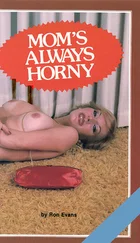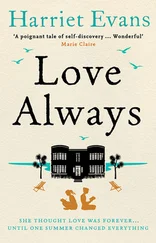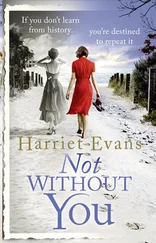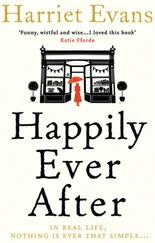Harriet Evans - Love Always
Здесь есть возможность читать онлайн «Harriet Evans - Love Always» — ознакомительный отрывок электронной книги совершенно бесплатно, а после прочтения отрывка купить полную версию. В некоторых случаях можно слушать аудио, скачать через торрент в формате fb2 и присутствует краткое содержание. Жанр: Старинная литература, на английском языке. Описание произведения, (предисловие) а так же отзывы посетителей доступны на портале библиотеки ЛибКат.
- Название:Love Always
- Автор:
- Жанр:
- Год:неизвестен
- ISBN:нет данных
- Рейтинг книги:3 / 5. Голосов: 1
-
Избранное:Добавить в избранное
- Отзывы:
-
Ваша оценка:
- 60
- 1
- 2
- 3
- 4
- 5
Love Always: краткое содержание, описание и аннотация
Предлагаем к чтению аннотацию, описание, краткое содержание или предисловие (зависит от того, что написал сам автор книги «Love Always»). Если вы не нашли необходимую информацию о книге — напишите в комментариях, мы постараемся отыскать её.
Love Always — читать онлайн ознакомительный отрывок
Ниже представлен текст книги, разбитый по страницам. Система сохранения места последней прочитанной страницы, позволяет с удобством читать онлайн бесплатно книгу «Love Always», без необходимости каждый раз заново искать на чём Вы остановились. Поставьте закладку, и сможете в любой момент перейти на страницу, на которой закончили чтение.
Интервал:
Закладка:
Something catches in my throat. She is smiling out at me. It’s like Cecily’s face, shining out of the drawer.
Frances Seymour
Highly acclaimed observer of Cornish landscape who never painted after 1963
Frances Seymour, who has died at the age of eighty-nine, was what one would cal a star. Not for her the flamboyance, the tantrums and temperamentality, clichés of the artist: she was universal y beloved, charismatic and beautiful, a magnet for men and women alike; her house, the beautiful Summercove near Treen in Cornwal , open to al and a haven for friends and family. She lit up every room she was in and her company was a rare gift.
Because of her charm and force of personality it is easy to forget, therefore, the gap Seymour created when she abandoned painting after the death of her youngest daughter Cecily, in a tragic accident. Frances never forgave herself for her daughter’s death, and some have speculated this was her form of penance, for the events of that summer in 1963. This is not established. What it is important to establish, however, is the role Frances Seymour played before that in sealing the reputation of British painting in the mid-twentieth century.
Frances Seymour was not a Cornish painter, or a female painter. She was simply one of the most talented artists of the last century.
This was my grandmother, I want to shout. I want to wave the paper out of the window, like the Kind Old Gentleman in The Railway Children .
Look how clever she was, how bril iant!
Tears come to my eyes, and I’m crying, I can’t help it. I don’t understand anything any more. I keep hearing Octavia’s voice, and when I close my eyes I can see her large grey eyes, her pointy noise, looming at me in the dark, as she oh-so-careful y stabs my mother in the back, over and over again. I want to hate her, to laugh at her, but I can’t. I ask myself why I can’t.
Because, despite what I said to her only an hour before, I’m terrified that she’s right.
I look out of the window, as if I expect to see someone’s face there. We have been going fast, through a blur of nondescript-looking vil ages, but suddenly it is dark, a landscape with no lights at al . I can see my own reflection in the window, nothing more. My neck and the newspaper are both startlingly white against the blackness outside, the blackness of my coat and dress. I stare at myself; I can’t see the tears; I look like a ghost. In the black and white of the light, I look like Cecily.
Careful y, I tear the obituary out of the paper and fold it. The tearing sound is loud, and the couple at the table next to me look up, curiously. I stand up and smile, backing away towards my room and when I get there, I fal onto the familiar old scratchy blue blanket and the smooth white sheets. I take the pages out of my pocket and sit on the lower bunk, holding them in my hand, gazing at them, at the scrawling black handwriting, my finger and thumb poised to turn the first page. I close my eyes.
And now I can see myself, suddenly, back at Summercove. There are voices I recognise, but they’re different somehow, thinner, higher. Bright sunshine is streaming into the living room, the smel of sea and grass and something else, something dangerous, almost tangible, rushing towards me . . . And Cecily’s face, as it was in the oil sketch. Come with me! Come with me , she is saying. And I do. I take a deep breath and I fol ow her, down to the sea.
The Diary of Cecily Kapoor, aged fifteen. July, 1963.
St Katherine’s School for Girls
Denmouth
Devon
England
If lost please return
Saturday, 20th July 1963
Dear Diary,
First day of holidays. That is – count it, my dears, count it –
SEVEN WEEKS of blissful beautiful no school!! !!
My summer project starts NOW.
I am writing this sitting on my bed at Summercove. On the patchwork quilt Mary sewed me when we first moved here and I was scared at night. One of Mummy’s sketches is on the wall, of our little cove down on the beach. There is a cupboard for our clothes built into the wall with sweet little plastic handles dotted with stars. What else? There are two shelves painted white with all my books on them (I share this room with my sister Miranda. But she only reads Honey magazine). I have everything from My Friend Flicka to Pride & Prejudice & they are all mine.
Today is the first proper day of the holidays. I got home yesterday. I love the luxury of the beginning of the hols, where time seems to stretch out before you, for ages & ages. We go back 8th Sept. It seems a lifetime away.
I have never kept a diary before. Two days ago, the last day of classes, Miss Powell gave everyone in our class ten pages of paper, tied together with string and our names on, and told us to keep a record of our summer holidays: she said to write down what we did, who we saw, and what happens. Everyone groaned when Miss Powell said it, but I was glad. I want to be a writer when I grow up & this is good practice.
No one else was that excited about it, only me really. Annabel Taylor, who can barely write in joined-up writing, looked completely appalled.
I have laid a wager with myself. It is that she will write 2 pages over the summer, and those will be about the boys she knows.
(that is not very nice of me).
Miss Powell says she will not look at our diaries herself, but she wants us to read some sections out to the rest of the class when we come back in the autumn. She says, in years to come, we will find them and read them and remember the summer of 1963. She says it is a year we will want to remember. I thought she meant because of Mr Profumo and the scandal. We’re absolutely not allowed to talk about it at school. Still, I hoped she might mention it. She just said something instead about the wind of change blowing. I like Miss Powell. She is younger than most of the teachers, and she has fantastic cropped hair, and she likes Bonjour Tristesse. Rita dies for Miss Powell, she cries about her at night.
Anyone’s better than Miss Gilchrist, say I. Awful woman with meaty hands, I’m sure she used to be in prison. Miss Powell isn’t like that.
Anyway, enough of silly school. It’s hard sometimes, to get back into the swing of life here after being away at St Kat’s for months on end.
One’s head is full of drear things like plimsolls and kit bags and hymnals. I’m back now. It’s over! (for a while).
So what shall I tell you, diary? I shall start by describing where I am and what’s happening.
It is after tea & the house is quiet, but there are sounds, all dear & familiar to me after months at school. Mary is in the kitchen, cooking supper; I can hear her feet on the floor & the pans clattering.
Dad is humming in his study. It sounds like wasps, buzzing. Dad is a famous sort of writer. He wrote a book people always want to talk about, called The Modern Fortress. I haven’t read it. But lots of people have. It is an IMPORTANT BOOK. Miss Green, our headmistress, said that to me last year. ‘IMPORTANT BOOK CECILY.’ That means she hasn’t read it, I absolutely bet.
(must be kind & what if they do read it even though they said they wouldn’t?) My cousins Louisa & Jeremy arrived today. They are playing with Claude, our dog, on the lawn. Louisa is wearing a beautiful striped bathing costume, I covet it. She has a new lipstick and she is terribly pleased with herself, for she has been offered a scholarship to Girton, and she is dreadfully ambitious and clever. Jeremy is at medical school in London. Jeremy is my favourite cousin, there are only two of them that I know, I don’t know my cousins in Lahore, in Pakistan, but perhaps I would like them more than Jeremy. I doubt it. He’s awfully nice.
Читать дальшеИнтервал:
Закладка:
Похожие книги на «Love Always»
Представляем Вашему вниманию похожие книги на «Love Always» списком для выбора. Мы отобрали схожую по названию и смыслу литературу в надежде предоставить читателям больше вариантов отыскать новые, интересные, ещё непрочитанные произведения.
Обсуждение, отзывы о книге «Love Always» и просто собственные мнения читателей. Оставьте ваши комментарии, напишите, что Вы думаете о произведении, его смысле или главных героях. Укажите что конкретно понравилось, а что нет, и почему Вы так считаете.












